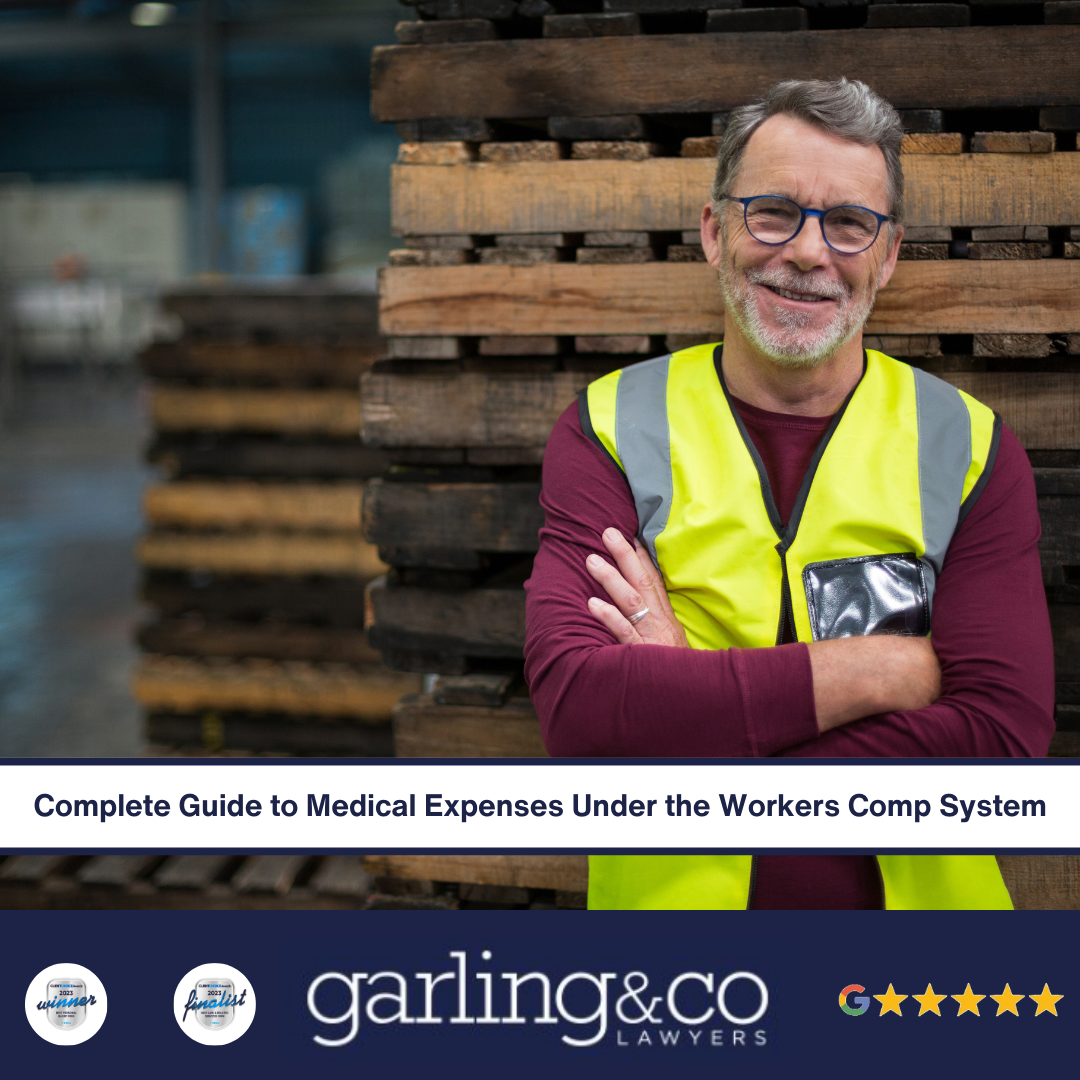Complete guide to medical expenses under the workers comp system
If you have sustained an injury in the course of your employment, the insurer is required to pay medical expenses in accordance with Section 60 of the Workers Compensation Act 1987.
The term has also been defined to mean “any necessity for relevant treatment which results from the injury where its purpose and potential effect is to alleviate the consequence of injury”. Another way of defining “reasonably necessary” is to ask if the injured worker cannot do without such treatment. If this test is then satisfied, the treatment would be “reasonably necessary”.
Often this test is confused to mean that the treatment must be reasonable and necessary. This is incorrect. That is a much more demanding test. If the treatment is such that its potential effect is to alleviate the consequence of injury, then it will be “reasonably necessary”.

Quick Links
The insurer is not required to pay for medical expenses if prior approval from the insurer has not been obtained (many exemptions to this rule are outlined below).
Section 60 states that the insurer is required to pay “reasonably necessary” medical treatment which includes:
- Medical or related treatment.
- Hospital treatment.
- Ambulance service.
- Work place rehabilitation services.
The insurer is also required to pay for the workers travel to and from such treatment.
What is "Reasonably Necessary"
The insurer is required to pay “reasonably necessary” medical expenses. In determining whether particular treatment is reasonably necessary, the insurer should have regard to:
- The appropriateness of the particular treatment.
- The availability of alternative treatment.
- The cost of the treatment.
- The actual potential effectiveness of the treatment.
- The acceptance by medical experts of the treatment as being appropriate and likely to be effect.
What type of medical and related expenses does the Insurer pay?
The insurer will pay reasonably necessary medical and related expenses as follows:
Medical and related treatment
Medical and related treatment includes:
- Treatment by medical practitioners, physiotherapist, chiropractors, osteopaths, psychologists, counsellors, exercise psychologists, remedial massage therapists and other allied health practitioners.
- Provision of artificial aids.
- Domestic assistance services.
- Nursing, medical and medicine supplies (provided outside of hospital treatment).
Hospital treatment
Hospital treatment includes treatment at public and private hospitals and/or rehabilitation centres.
Ambulance service
Ambulance service includes emergency, non-emergency and inter hospital transfers provided by the Ambulance Service of NSW.
Work place rehabilitation services
Work place rehabilitation services include:
- Return to work in case management.
- Vocational, functional and work place assessments.
- Job analysis and modification.
- Identification of suitable employment.
- Worker retraining and placement in suitable employment.
Travel expenses
To claim for payment for travel to attend medical, hospital and rehabilitation appointments, the worker will need to keep:
- A record of the mileage if the worker used his or her car; and/or
- Receipts for public transport.
The maximum amount payable for private car travel associated with attending medical expenses is currently $0.55 per kilometre.
Do medical expenses require prior approval?
Section 60 (2A) of the Workers Compensation Act states that the insurer is not liable to pay for the cost of medical treatment without prior approval of the insurer. However, there are a number of exceptions for a lack of prior approval and they include the following:
- Any treatment provided within 48 hours of the injury.
- Attending a nominating treating doctor for a consultation or to obtain a medical certificate.
- The first consultation with a specialist medical practitioner on referral by the nominated treating doctor.
- All plain x-rays performed on referral from a nominated treating doctor or specialist medical practitioner.
- Any service provided in a public hospital on presentation to an emergency department.
- In relation to physiotherapy, osteopathic or chiropractic treatment, the initial consultation and up to a further 7 treatment sessions provided the practitioner is registered and the injured worker has not previously received such treatment for the injury claimed.
- Pharmacy items prescribed by the nominating treating doctor within the first 3 weeks post injury up to a maximum of $500.00.
- For any psychological treatment or counselling, the initial consultation and up to a further 5 treatment or counselling sessions where the counsellor is WorkCover approved and the worker has not previously received such counselling.
- Payment of up to 5 sessions of remedial massage however the remedial massage therapist must be WorkCover approved.
- In relation to a hearing needs assessment, the initial hearing needs assessment as long as such assessment was referred by the nominated treating doctor or treating specialist.
- The Workers Compensation Commission or a registrar orders the insurer to pay for treatment expenses.
How do I claim the medical expenses?
When you initially make a claim for workers’ compensation you will receive a claim number from the nominated insurer. You should provide that claim number directly to your treating doctors and medical providers.
The medical provider should send their accounts direct to the insurer for payment.
If you have paid for medical treatment yourself and are requesting reimbursement, then you should collate all accounts/receipts that you have in relation to such treatment and forward it to the insurer and request reimbursement, including the costs of travel expenses incurred.
The easiest way to do so is to provide an excel spreadsheet setting out the claim and attaching the receipts/accounts.
Once I request prior approval for payment of treatment expensed, how long does the insurer have to reply?
If you require the prior approval for payment of treatment from an insurer, for example, such as the cost of surgery, you need to provide to the insurer a report or treatment plan from the treating doctor or specialist which specifies:
- The services proposed.
- The anticipated outcome.
- The duration.
- The frequency.
- The cost of the service.
This report is usually completed by the Doctor on your behalf.
Once such a report or treatment plan is received, the insurer is required to then approve payment of reasonably necessary medical treatment within 21 days.
If there is insufficient or inadequate information to make a decision the insurer is to request further information from the treatment provider. Failing this, the insurer may then obtain an independent medical opinion.
If the insurer fails to respond to a request for a specific treatment after the provision of a report or a treatment plan within 21 days, the worker may refer the matter to the WorkCover Customer Service Centre on 13 10 50 for assistance. The Centre will contact the insurer and request a response.
If the insurer does not respond or the reply is inadequate, the worker may take the matter to the WorkCover Independent Review Office (WIRO) who can investigate the complaint. WIRO can be contacted on 13 9476 or a complaint can be lodged at www.wiro.nsw.gov.au
If the insurer continues to fail to respond to the request, then you need to consult an Accredited Specialist in Personal Injury Law who can commence proceedings in the Workers Compensation Commission seeking an order that the insurer pay for the cost of the reasonably necessary treatment.
If a worker has paid for reasonably necessary medical treatment and has requested reimbursement from the insurer, the insurer is required to make such reimbursement within 7 days after the workers’ request.
If the worker has paid for travelling expenses to receive medical treatment or attend a medical appointment, the insurer is to reimburse the worker within 7 days after the workers’ request for payment.
Can the Insurer decline payment for medical expenses?
Yes. The insurer can decline payment of any medical treatment on the basis that it does not accept that it is “reasonably necessary” (see definition previously).
If the insurer declines to pay for any medical treatment, they are required pursuant to Section 74 of the Workplace Injury Management Act to provide a notice in writing of the reasons and evidence upon which the insurance company relies to decline payment of the treatment. The insurer must include a copy of all relevant information including any medical reports they relied upon in making their decision.
An injured worker is entitled to request a review of any such decision. However, in our experience reviews are almost always unsuccessful and are usually a waste of time.
If you receive a Section 74 Notice declining liability for payment of treatment expenses, you need to consult an experienced Accredited Specialist in Personal Injury Law immediately.
How long will the Insurer pay for my medical treatment?
The insurer is required to pay for all reasonably necessary medical treatment as follows:
- If the injury has resulted in a degree of permanent impairment of 10% or less, the insurer is required to pay medical expenses for a maximum period of 2 years from the date of the claim or from the date on which weekly payments of compensation ceased to be payable to the worker, whichever occurs later.
- If the injury has resulted in a degree of permanent impairment of more than 10% but not more than 20%, the insurer is required to pay medical expenses for a period of 5 years from the day on which the claim was made or from the date on which weekly payments of compensation cease to be payable to the worker, whichever occurs later.
- If the injury has resulted in a degree of permanent impairment of 21% or more, then medical expenses are payable for the remainder of the workers’ life.
There are some exceptions to the above. The worker may obtain payment for the following medical related treatment at any time regardless of the assessment of whole person impairment:
- Crutches, artificial members, eyes or teeth, other artificial aids or spectacles, including hearing aids.
- Any modifications of a workers home or vehicle.
- Secondary surgery.
Secondary surgery, is surgery which is directly consequential on earlier surgery and effects the same part of the body as the earlier surgery. The secondary surgery must be approved within two years of the earlier surgery.
If you have any questions at all, no matter how silly you think it is, please contact me at mgarling@garlingandco.com.au and outline your circumstances and I will personally respond. I receive many emails for help each day and personally respond to all.
For more information on Workplace Compensation Claim Success, read our guide here.












